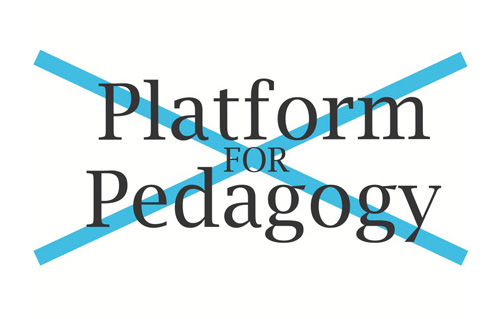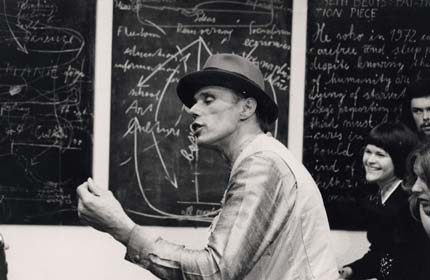 Platform for Pedagogy is a tool I’ve come to heavily rely on, living in the overwhelming myriad of cultural events and opportunities that is New York City. C0founded in 2008 by Boško Blagojevic and Xenia Pachikov and run by John Arthur Peetz, Jessica Loudis and Allison Rodman, Platform offers a curated list of public lectures and forums taking place in the city through weekly email bulletins and an easy-to-navigate website. Encouraging diverse and accessible programming in institutions, their main purpose is to promote the public lecture as a model for learning within and across disciplines. I asked Blagojević a few questions about Platform’s approach and upcoming projects they’re working on:
Platform for Pedagogy is a tool I’ve come to heavily rely on, living in the overwhelming myriad of cultural events and opportunities that is New York City. C0founded in 2008 by Boško Blagojevic and Xenia Pachikov and run by John Arthur Peetz, Jessica Loudis and Allison Rodman, Platform offers a curated list of public lectures and forums taking place in the city through weekly email bulletins and an easy-to-navigate website. Encouraging diverse and accessible programming in institutions, their main purpose is to promote the public lecture as a model for learning within and across disciplines. I asked Blagojević a few questions about Platform’s approach and upcoming projects they’re working on:
TT: Platform for Pedagogy started in 2008. Was this in response to anything specific? How did the project begin?
BB: In some sense it was this: finding myself dislodged from the then-comfortable environs of a university affiliation, a degree-oriented program, a project. Finding myself alone in a city with so many others.
TT: How do you choose your listings? Are there any particular aspects–venues, topics, people–that stand out?
BB: I guess there is a politics to every selection, a perceived or actual affiliation, an unspoken alliance, some long-standing grudge, a personal animosity, structural nepotism, deep intuition, superficial interest, hostility to an idea or scene, a certain institutional context, the reciprocal volley of desired or actual support, the timeliness of the thing. There is also conviction, belief. This may be the most powerful animating force of all.
TT: Do you consider Platform’s listings as archival, something that is meant to be permanent or serve as a point of reference in the future? If yes, what is the importance of having that record?
BB: Like so many things in life, it’s a matter better settled by any besides its initiators. The system itself that constitutes our website and email appendage is merely an interface we developed to a dozen or so SQL tables that are continuously cultivated and maintained by our staff of editors. The data that accrues there represents something, yes.
TT: Like the public lecture, the salon originated out of a need for people outside of institutional academia to participate in an intellectual dialogue. However, lectures are perhaps more formal and authoritative–allowing less back and forth and presenting a precise understanding of a subject. Why did you choose to focus entirely on lectures as opposed to other pedagogical formats?
BB: I personally like the lopsided power structure of such privileged speech. The horizontality you bring up in the first part of your question—at least in your example—is sustained by the private contours of a closed room, a familiar circle. The kind of freedom that transpires in some classrooms, salons, or dinner parties is both an effect and symptom of their exclusive character, of the privacy offered to everyone in the room as soon as we close the door. While that sort of privacy remains sacred (perhaps now, more than ever) our project is less about identifying and promoting it so much as assembling bodies to create provisional and roving alternatives.
TT: You are currently working on a book titled, Should I go to Grad School?. Could you please describe in more detail what kind of structure the book will take and how it will confront this question?
BB: There are rumors, yes. I would prefer not to talk too much about the project at this point, as it is still in a very vigorous and vital process of development.
TT: On your website you mention several events that have been organized with or in conjunction with Platform. What are some examples?
BB: We’ve had a rougish and evolving cast of protagonists that have worked with us to program video screenings, talks, and performances in the past. We publicize different projects with different intensity and purpose. These things happen from time to time.
TT: In an interview with Mimi Luse, you reference Joseph Beuys as an artist whose practice relies on a sort pedagogical vocabulary. Are there other artists or writers that have played an influential role in the development of Platform?
BB: If we must think of artists in particular—I suppose we are inspired by those who dare to write critically, speak publicly, to meddle in business where there is no invitation to do so. Those that invent context and permission for themselves without qualification or apology. One person that comes to mind is Martha Rosler, who has been a long-time friend and supporter. There are many other friends to the program from the world of art, and from other worlds. I learned a lot about love and communication from R. Kelly and Prince.
TT: What are the end goals for Platform? What do you hope to accomplish?
BB: One of our biggest ambitions is to make the world of serious ideas more open and accessible—particularly to people outside of university systems, who don’t necessarily work as professional graduate students or academics. La trahison des clercs. We’d like to see increased visibility and attendance to the dozens of public talks and free conferences that happen in New York’s powerful universities every week. We’d love to see more professionals—people who read the New Yorker or Vanity Fair—in Schermerhorn Hall, even if they never went to Columbia. And we’d like to evolve our own organization into something even more robust and sustainable that can continue to serve the people of New York, Chicago, and eventually others, for many years to come.
Platform for Pedagogy serves knowledge-thirsty individuals through their New York and Chicago websites. They can also be followed on Facebook and Twitter.




